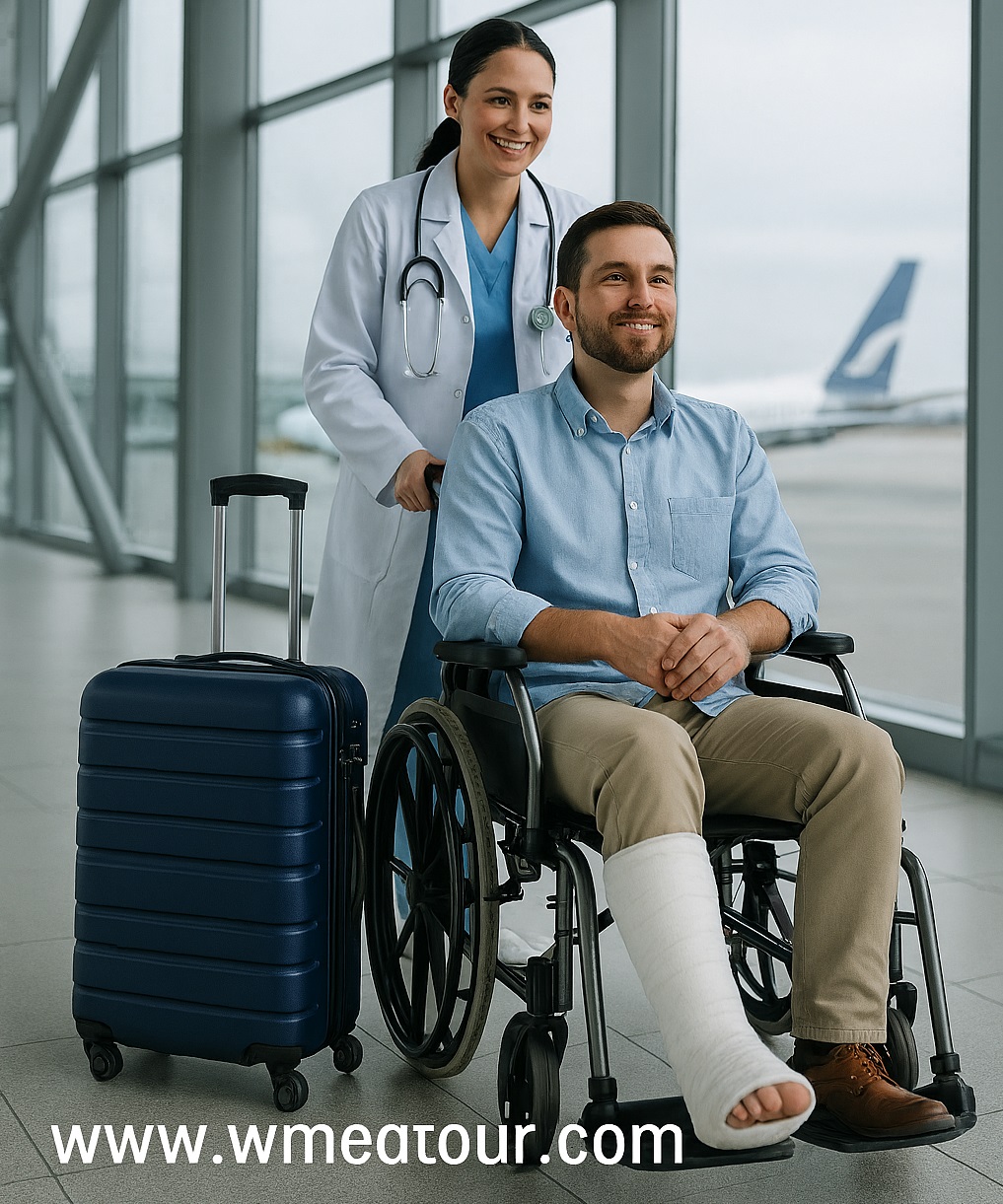Medical Tourism Orthopedic Surgery: Your Complete Guide to Care Abroad
Considering orthopedic surgery services? You’re not alone. Many people now look beyond their home country to find better options. This comprehensive guide will walk you through the world of medical tourism for orthopedic surgery, highlighting top destinations, what to look for in a clinic, and how to ensure a smooth, successful journey. Let’s explore how you can get the best treatment, often at a fraction of the cost.
For many, the high costs and long wait times for orthopedic procedures in their home country can be a significant barrier. Moreover, a lack of access to specific, cutting-edge treatments can also drive the search for alternatives. Consequently, millions of patients worldwide now travel for care, particularly for complex procedures like joint replacements and spinal surgeries. This trend, known as medical tourism, has become a lifeline for those seeking a more accessible pathway to health. You’ll find that a well-planned medical trip can provide not only financial relief but also access to some of the world’s most talented surgeons and advanced technologies. When you’re ready to explore your options, consider the benefits of a guided medical tourism orthopedic surgery experience.
Why Choose Medical Tourism for Orthopedic Procedures?
The decision to travel for surgery is a big one, yet it comes with numerous compelling advantages. Chief among these is the dramatic cost savings. For example, a hip replacement in the United States could cost upwards of $40,000, while the same procedure in destinations like Iran or Turkey might be less than $10,000. In addition to cost, patients often find they can bypass lengthy waitlists, getting the care they need much sooner. This is especially critical for those in chronic pain or with rapidly progressing conditions. Furthermore, many medical tourism hubs have specialized hospitals that focus solely on a particular field, like orthopedics. This level of specialization often translates into better outcomes and a more streamlined patient experience. Ultimately, the ability to combine high-quality care with significant savings makes medical tourism an attractive option for a growing number of people looking for a medical tourism orthopedic surgery solution.
Common Orthopedic Surgeries Sought by Medical Tourists
Orthopedic procedures are among the most popular for medical tourists. This is largely because they are often elective surgeries for chronic conditions, making them ideal for planned travel. Common procedures include:
- Knee and Hip Replacement (Arthroplasty)
- Spinal Surgery (e.g., fusion, discectomy)
- Sports Injury Treatment (e.g., ACL reconstruction)
- Shoulder and Elbow Surgery
- Foot and Ankle Surgery
As a result, hospitals and clinics in popular medical tourism destinations have built up extensive expertise in these areas. For instance, a hospital specializing in knee replacements will have surgeons who perform hundreds of these procedures a year, leading to a high level of proficiency and often, better patient outcomes. So, when you’re looking for a destination, it’s worth investigating their specific areas of specialization. Ultimately, this focus on specific procedures means you are more likely to receive care from an expert in your exact condition, which is a major benefit of traveling for care. This is the essence of a successful medical tourism orthopedic surgery experience.
How to Plan Your Medical Tourism Journey for Orthopedic Surgery
Step-by-Step Guide to Planning Your Orthopedic Medical Trip
-
Step 1: Research and Consultation
Start by researching potential destinations and hospitals. Look for internationally accredited facilities and surgeons with excellent credentials. Contact a medical tourism facilitator like wmedtour.com to get a personalized consultation. They can help you find the right hospital and surgeon for your specific needs, and provide initial cost estimates.
-
Step 2: Collect Your Medical Records
Gather all relevant medical information, including recent X-rays, MRI scans, and a doctor’s diagnosis. This documentation is crucial for the foreign surgeon to assess your case accurately and propose a treatment plan. Be sure to have these records translated if necessary.
-
Step 3: Arrange Travel and Accommodation
Once you have a confirmed surgery date, book your flights and a place to stay. Many hospitals offer packages that include airport transfers, accommodation, and post-operative care. Check if the hospital or a medical tourism agency provides these services to simplify your logistics.
-
Step 4: Prepare for Your Recovery
Your recovery period is just as important as the surgery itself. Plan for an adequate stay post-operation, usually one to two weeks, to ensure you are stable enough for travel. Follow your doctor’s instructions meticulously and schedule follow-up appointments as needed. Additionally, make sure you have a support system, whether it’s a family member traveling with you or a caregiver arranged through your medical tourism provider.
Key Factors When Choosing a Destination for Orthopedic Surgery
When selecting a country for your orthopedic procedure, several factors should guide your decision. Naturally, the cost of treatment is a primary consideration, but it shouldn’t be the only one. Similarly, you need to weigh the quality of medical facilities. Look for hospitals that have international accreditations, such as from the Joint Commission International (JCI), which signifies they meet a global standard of care. Furthermore, a country’s reputation in specific medical fields is a strong indicator of quality. For example, some countries are renowned for their expertise in spine surgery, while others excel in joint replacements. Therefore, doing thorough research on a country’s medical specializations can save you from a lot of trouble down the line. Finally, consider the country’s visa requirements, cultural factors, and language barriers, all of which can impact your overall experience. Ultimately, the right choice for medical tourism orthopedic surgery will balance cost, quality, and convenience to fit your personal circumstances.
A Comparison of Top Medical Tourism Destinations for Orthopedic Surgery
| Destination | Average Cost (Hip Replacement) | Key Specialties | Accreditations & Reputation | Recovery Environment |
|---|---|---|---|---|
| Iran | $4,000 – $8,000 | Joint Replacement, Spine Surgery | Internationally recognized surgeons, modern hospitals, advanced tech. Learn more. | Affordable, great hospitality, and post-op care services. |
| Turkey | $8,000 – $12,000 | Orthopedic Oncology, Sports Injuries | Numerous JCI-accredited hospitals, high-tech facilities. | Well-established medical tourism infrastructure, good for combined vacation. |
| South Korea | $10,000 – $15,000 | Spine Surgery, Robotic Procedures | Leading-edge technology, highly advanced surgical techniques. More info here. | Excellent patient experience, high-tech recovery facilities. |
| Germany | $15,000 – $25,000 | Complex Orthopedics, Joint Replacement Revision | World-class standards, long-standing reputation for medical excellence. Check global health data. | Top-tier care, but at a higher price point. |
| India | $5,000 – $10,000 | Joint and Spine Surgery, Trauma Care | Large number of JCI-accredited hospitals, massive patient volume. Visit medical tourism site. | Very affordable, good English-speaking staff. |
The Importance of Choosing an Accredited Orthopedic Hospital
Above all, the safety and quality of your care should be your top priority. Choosing a hospital with international accreditation is one of the best ways to ensure this. For instance, the Joint Commission International (JCI) accreditation is a gold standard. A JCI-accredited hospital has undergone a rigorous review process and meets strict quality and safety standards. Similarly, look for surgeons who are board-certified and have extensive experience in the specific procedure you need. You should feel comfortable asking about their experience, success rates, and the technology they use. Ultimately, a hospital’s reputation and the surgeon’s expertise are far more important than a low price. Therefore, don’t hesitate to ask for patient testimonials or case studies to help inform your decision. For more information on finding the right hospital, you can explore resources from the Joint Commission International.
Pre-Operative Care and Post-Operative Rehabilitation for Medical Tourism Orthopedic Surgery
The journey to recovery from orthopedic surgery extends well beyond the operating room. First, it is important to follow all pre-operative instructions, which might include dietary changes, medication adjustments, and specific exercises. This preparation can significantly impact the success of your surgery and your recovery. In fact, many medical tourism packages include comprehensive pre-operative support. After your surgery, post-operative care is crucial. You’ll need to stay in the hospital or a nearby hotel for a period to receive physical therapy and monitoring. This ensures you regain mobility and strength before returning home. Accordingly, most top-tier medical tourism providers, like those on wmedtour.com, include follow-up and rehabilitation plans in their service packages. This continuum of care is what truly sets a high-quality medical tourism orthopedic surgery experience apart from a simple surgical trip. In conclusion, a comprehensive approach to both pre- and post-operative care is absolutely essential for a successful outcome. Additionally, consider asking your surgeon what kind of rehabilitation program they recommend for your specific procedure.
Considering the “Why”: Beyond the Price Tag
While cost is often the main driver, the non-financial benefits of medical tourism should not be overlooked. For instance, some countries offer more advanced surgical techniques or technologies that may not be available in your home country. This could include robotic-assisted surgery for greater precision or minimally invasive procedures that lead to faster recovery times. Additionally, the personalized care and hospitality offered by medical tourism providers can make the entire experience feel less like a clinical procedure and more like a holistic journey to wellness. Ultimately, the opportunity to combine a life-changing medical procedure with a visit to a new country and culture can make the experience profoundly positive. For this reason, many patients report feeling more relaxed and optimistic during their recovery. For more on the benefits, you can refer to reports from the Medical Tourism Association.
Final Thoughts on Your Medical Tourism Orthopedic Surgery Journey
Embarking on a medical tourism journey for orthopedic surgery can be a life-changing decision. It offers a viable alternative to high costs and long waits, while also providing access to world-class medical expertise. By following the steps outlined in this guide and prioritizing quality and accreditation, you can significantly reduce the risks and maximize the benefits. We highly recommend you consult with a trusted medical tourism facilitator, like wmedtour.com, to streamline the process. They can provide you with a comprehensive plan, from initial consultation to post-operative care, ensuring you have a seamless and stress-free experience. Ultimately, your health is a priority, and with the right planning, you can find the perfect solution for your orthopedic needs abroad. Take the first step today and discover a world of possibilities for your health and well-being.
Frequently Asked Questions (FAQ)
Is medical tourism safe for major orthopedic surgery?
Yes, medical tourism can be very safe, provided you choose an accredited hospital with a good reputation. It is crucial to research the surgeon’s credentials and ensure the facility follows international safety standards. Many countries have state-of-the-art hospitals with JCI accreditation, which is a testament to their high standards of care.
What are the typical costs of orthopedic surgery abroad?
Costs vary widely depending on the country and the procedure. For example, a hip replacement in Iran can be as low as $4,000 to $8,000, while in Turkey it might be $8,000 to $12,000. These prices generally include the surgery, hospital stay, and some level of post-operative care, offering significant savings compared to Western countries.
How do I choose the right surgeon and hospital?
Look for surgeons who are board-certified and specialize in your specific condition. Check the hospital’s accreditations (e.g., JCI), and read patient reviews and testimonials. A reputable medical tourism facilitator can provide you with detailed profiles of surgeons and facilities to help you make an informed decision.
What is the recovery process like after orthopedic surgery abroad?
Recovery is a crucial part of the process. You will typically stay in the host country for 1-3 weeks for initial recovery and physical therapy. Your medical tourism provider will coordinate follow-up appointments and a rehabilitation plan. It’s essential to follow your surgeon’s instructions precisely to ensure a successful recovery.
Do I need to get a visa for medical travel?
Visa requirements depend on your nationality and the destination country. Some countries offer specific “medical visas” that facilitate the process. A reliable medical tourism agency can assist you with the necessary paperwork and ensure you have all the required documents for your trip.
How do I get my medical records to the foreign surgeon?
You can typically send digital copies of your medical records, including scans and reports, via a secure online portal provided by the hospital or medical tourism agency. Make sure all documents are well-organized and, if necessary, translated into English or the local language.
Will there be a language barrier?
Many hospitals that cater to international patients have staff who are fluent in English. Additionally, medical tourism agencies often provide translators and interpreters to ensure clear communication between you and the medical team. This helps to reduce stress and ensure you understand all aspects of your treatment.
What are the risks of medical tourism for orthopedic surgery?
As with any surgery, there are risks, but they can be mitigated by careful planning. The key risks include a lack of legal recourse if something goes wrong, potential complications during the flight home, and difficulty with long-term follow-up care. Therefore, it’s vital to work with a reputable provider who offers comprehensive post-op support and travel guidance.
Can I combine my surgery with a vacation?
Yes, many patients choose to do so, though it’s important to be realistic about your post-operative condition. A short, relaxed trip for a few days before the procedure is possible. However, the period immediately following surgery should be dedicated to rest and recovery. You can plan sightseeing activities for your recovery period once your doctor gives you the green light.
What is the role of a medical tourism facilitator?
A facilitator acts as a one-stop-shop for your medical trip. They help you with everything from finding the right doctor and hospital to arranging your travel, accommodation, and post-operative care. They can also assist with translations and communication, making the entire process seamless and less stressful.
How do I arrange for follow-up care when I get home?
Before you travel, you should discuss your post-operative care plan with your local doctor. Your overseas surgeon can provide a detailed report and recommendations for your follow-up care and physical therapy. A good medical tourism agency will ensure you have all the necessary documents and a clear plan to share with your home healthcare provider.
What types of orthopedic procedures are most common for medical tourists?
The most common procedures are joint replacements, particularly for the knee and hip, and various spine surgeries. Sports-related injuries, like ACL reconstruction, are also popular. Many patients seek these procedures abroad due to the high costs and long wait times in their home countries.
Can I get robotic-assisted surgery abroad?
Yes, many top medical tourism destinations, including South Korea and Germany, have invested heavily in cutting-edge technology like robotic surgical systems. These systems can lead to greater precision, smaller incisions, and faster recovery times. You can specifically inquire about this technology when choosing your hospital.
What happens if there are complications during the trip?
Reputable medical tourism providers have contingency plans for such situations. The hospital staff will provide immediate care for any complications. It’s a good idea to purchase medical travel insurance that covers potential complications and extended stays. You should always discuss this with your facilitator beforehand to be fully prepared.
How long should I stay in the destination country?
The recommended length of stay varies by procedure, but generally, it’s between one to three weeks. This period allows for immediate post-operative monitoring, physical therapy, and a final check-up with the surgeon before you are cleared to fly home. Longer stays are often necessary for complex surgeries.
Are the medical devices (implants, prosthetics) used abroad of high quality?
Leading international hospitals use implants and devices from globally recognized manufacturers (e.g., Stryker, Zimmer Biomet, DePuy Synthes). Before your surgery, you can ask your surgeon about the specific brand of implant they will use to ensure it meets international quality standards. Your medical tourism provider can provide this information upfront.
Is it possible to get a second opinion from an international surgeon?
Yes, many patients seek a second or even a third opinion from international surgeons. Reputable medical tourism facilitators can arrange for virtual consultations and case reviews with multiple specialists before you commit to a trip. This process helps you compare treatment plans and choose the best option for your health.
What should I pack for my medical trip?
Beyond your personal items, you should pack loose, comfortable clothing, slip-on shoes, and a copy of all your medical records. Don’t forget any current medications and a detailed list of your allergies. Your medical tourism provider can offer a customized packing list based on your specific procedure.
How can I verify the accreditation of a hospital?
You can verify a hospital’s accreditation by checking the official website of the accrediting body, such as Joint Commission International (JCI). The hospital’s own website should also prominently display its accreditations. A trustworthy medical tourism agency will only work with accredited and reputable facilities.
What are some common orthopedic procedures not covered by insurance at home that are sought abroad?
Procedures like advanced stem cell therapies, certain cosmetic orthopedic surgeries, or very specific, new joint preservation techniques may not be covered by standard insurance plans. Medical tourism provides a way to access these treatments without prohibitive out-of-pocket costs.




